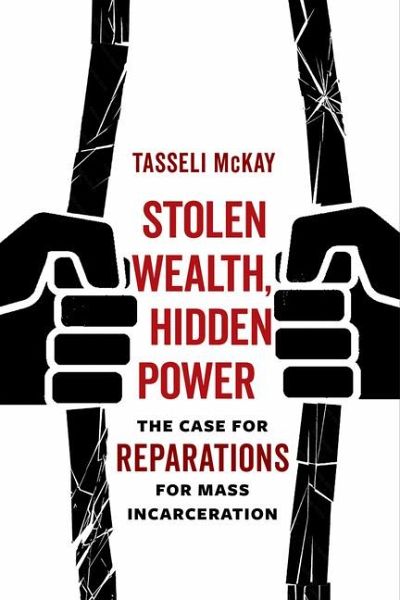
Stolen Wealth, Hidden Power
The Case for Reparations for Mass Incarceration
Versandkostenfrei!
Versandfertig in 2-4 Wochen
34,99 €
inkl. MwSt.

PAYBACK Punkte
17 °P sammeln!
"Tasseli McKay brilliantly draws on historical facts and cultural context to describe the immense cost and harm the prison industrial complex has had on Black families for generations. McKay accounts, in great detail, how the carceral system in this country is a failed experiment, and she urges us to reckon with this legacy and expand our understanding of reparations. This text is an important contribution to our liberation work as abolitionists, as we create systems that center an economy of care and move away from harm and punishment."--Patrisse Cullors, New York Times-bestselling author, ed...
"Tasseli McKay brilliantly draws on historical facts and cultural context to describe the immense cost and harm the prison industrial complex has had on Black families for generations. McKay accounts, in great detail, how the carceral system in this country is a failed experiment, and she urges us to reckon with this legacy and expand our understanding of reparations. This text is an important contribution to our liberation work as abolitionists, as we create systems that center an economy of care and move away from harm and punishment."--Patrisse Cullors, New York Times-bestselling author, educator, artist, and abolitionist "This study of black overincarceration in the United States combines compassion and rigor. McKay also provides, for the first time, a systematic, comprehensive calculation of the monetary costs to African Americans of the nation's predisposition to mass incarceration. This is a vital contribution to the wider conversation on reparations for Black American descendants of US chattel slavery."--William Darity, Director, Samuel DuBois Cook Center on Social Equity, Duke University "McKay writes with an unvarnished honesty and makes a compelling case for reparations for Black Americans. Her analysis clearly shows that the imprisonment of Black bodies, from slavery to convict leasing to mass incarceration, has been a staple of the United States since its inception. The case for reparations is not only because restitution must be paid to Black people. It is also how America can heal from its racial woes."--Rashawn Ray, Professor of Sociology, University of Maryland "Black Americans have been unduly harmed by mass incarceration, leaving families, communities, and livelihoods devastated. McKay confronts the damaging effects of mass incarceration through a critical accounting of the ways Black people, and especially Black women, carry the burden of labor and production despite a system dedicated to annihilating them. By providing a detailed framework for racial redress, McKay reminds us that reparations are both possible and required if we are to move toward liberation for all people. This book is necessary reading for all those seeking to understand the material consequences of mass incarceration and committed to reparative justice for the communities most affected by the prison industrial complex."--Jenn M. Jackson, Assistant Professor of Political Science, Syracuse University












